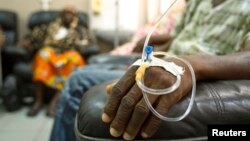In 2022, there were an estimated 20 million new cancer cases globally, and 9.7 million deaths, according to the WHO. Overall, about 1 in 5 people develop cancer in their lifetime with 1 in 9 men and 1 in 12 women dying from the disease.
Over 35 million new cancer cases are predicted in 2050, a 77% increase from the estimated 20 million cases in 2022.
The WHO report attributes the rapid growing global burden on aging population growth, as well as changes to people’s exposure to risk factors associated with socioeconomic development.
Tobacco and alcohol use, infections, UV exposure and obesity are key reasons behind the increasing incidence of cancer.
WHO Director-General Tedros Ghebreyesus says to fight inequality in treatment of the disease, countries need to invest in access to cancer services to bolster prevention, screening and treatment.
"New estimates show that 1 in 5 people globally will develop cancer. Low-income countries are seeing the fastest growth of cancer. Globally, two-thirds of countries do not include affordable access to priority cancer services in their health benefit packages," he said.
In Africa, cancer accounts for nearly 1 in 6 deaths, with cervical, breast, liver, prostate and non-Hodgkin's lymphoma being the most common forms. Breast cancer kills more women in the region than any other form.
"On the 4th of February every year, the world unites to raise awareness on fundamental cancer issues. We at the WHO African Region connect with the public in spearheading this annual awareness day and beyond," regional director for WHO, Matshidiso Moeti, said in a statement.
Cancer patients in Africa are often diagnosed with advanced cases and do not complete their care due to the high cost of treatment. Many patients must pay out of pocket for care.
An initiative by the WHO and its partners has helped to increase access to radiotherapy and diagnostic imaging services used in cancer care, focusing on low- and middle- income countries.
"Two years ago, WHO and International Atomic Energy Agency joined forces for the Rays of Hope Initiative to address long standing inequities in radiotherapy. Of the twelve million people diagnosed with cancer in low- and middle-income countries only half have access to radiotherapy," Tedros said.
Some countries like Benin, Chad, Democratic Republic of the Congo, Kenya, Malawi, Niger and Senegal have received radiotherapy and medical imaging machines to help in delivering treatment in those countries.















Forum